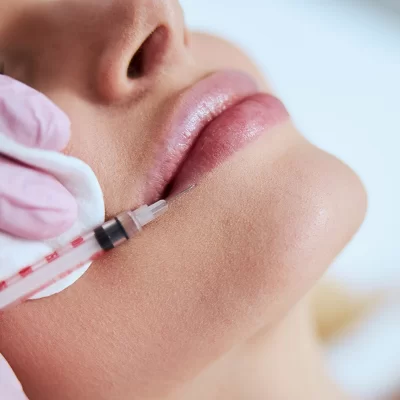How to reduce swelling after lip augmentation?
- Why do lips swell after the procedure and how long does the swelling last?
- How to apply cold compresses to effectively reduce swelling of the lips?
- What preparations and medications will help alleviate pain and bruises?
- How to properly care for and moisturize lips after a procedure?
- What to avoid to not worsen swelling and speed up the healing of the lips?
- How to distinguish normal symptoms of healing lips from worrisome signals?
- What to do in case of complications after lip augmentation?
Why do lips swell after the procedure and how long does the swelling last?
The appearance of swelling after the lip augmentation with hyaluronic acid is a natural phenomenon. It results from tissue damage caused by the needle, leading to inflammation and fluid accumulation. Additionally, hyaluronic acid itself, being a filler, naturally binds water, exacerbating the swelling.
Typically, the swelling subsides within 2-4 days, but in some individuals, it can persist for up to 2 weeks. The full and final effect of the procedure, with the correct volume of lips (which will be about 30% smaller than immediately after the injection), will only be visible after the complete disappearance of swelling.
After lip augmentation, swelling often occurs. To effectively reduce it, it is best to apply cold compresses, which are most helpful within the first 24 to 48 hours after the procedure. Gel compresses, ice wrapped in a clean cloth, or even chilled cucumber slices work great. Apply the compresses very gently and keep them on for 10-15 minutes. Repeat this process several times a day.
Remember not to press too hard on the lips - it could negatively affect the breakdown of hyaluronic acid. Low temperatures constrict blood vessels, effectively reducing swelling and bruising, as well as providing relief from discomfort.
After the lip augmentation procedure, you may experience pain or discomfort. Paracetamol can effectively alleviate these symptoms, also reducing tenderness. Additionally, nonsteroidal anti-inflammatory drugs (NSAIDs) such as ibuprofen can be used. However, always consult their use with a doctor – it is crucial for your safety and health.
In case of bruising or hematomas, a cream with arnica will be helpful. Not only will it accelerate their absorption, but it will also have an anti-inflammatory effect. Furthermore, specialized post-procedure creams will effectively reduce swelling, soothe pain, and alleviate burning sensation.
Remember to always choose products recommended by a specialist – it guarantees their safety and effectiveness.
Proper lip care after treatment is crucial for their quick regeneration and achieving lasting and satisfactory effects. Remember about hygiene, using only gentle cleansing products.
It is also important to hydrate the body properly - drinking a minimum of two liters of water a day supports the action of hyaluronic acid. Lips also require intensive external moisturizing, so regularly apply moisturizing balms and other dedicated cosmetics. Choose products containing ingredients such as:
-
ceramides,
-
panthenol,
-
squalane,
-
aloe,
-
collagen,
-
peptides.
Also, remember to protect your lips from the sun - use lip balms with UV filter.
After lip augmentation procedure, proper care for healing and minimizing swelling is important. For 2 weeks, especially in the first few days after the procedure, certain factors should be avoided. Specifically, refrain from intense physical exertion. Avoid extreme temperatures - saunas, tanning beds, sun exposure, and cold weather.
To support the proper healing of the lips, avoid alcohol and cigarettes. Follow a gentle diet: do not eat hot or spicy foods, only drink cool beverages.
To promote the correct healing of the lips, one should:
- Avoid touching, pressing, or licking the lips,
- Refrain from wearing makeup for the first 24 hours after the procedure,
- Limit intense facial expressions,
- Avoid passionate kissing,
- Protect the lips from irritating substances and injuries,
- Abstain from excessive physical exertion,
- Do not use saunas and tanning beds,
- Avoid direct exposure to the sun and low temperatures,
- Refrain from consuming alcohol and smoking cigarettes,
- Avoid eating hard or very hot foods.
After lip augmentation, swelling is a natural reaction of the body because the needle disrupts the tissues, and hyaluronic acid binds water. Typically, lip swelling subsides within 2-4 days, but in some cases, it can last up to 2 weeks. The full effect of the procedure will be visible once the swelling completely resolves.
Swelling, pain, and bruising are common symptoms after the procedure. However, contact your doctor immediately if you notice concerning symptoms such as:
-
increasing swelling,
-
severe, persistent pain,
-
paling of the lips,
-
signs of infection,
-
allergic reaction,
-
appearance of cold sores.
A quick response to concerning symptoms is crucial for your safety and health.
If any complications arise after lip augmentation, do not delay in reacting. Instead of waiting for a scheduled follow-up visit, immediately consult a doctor who will determine the appropriate treatment.
Common abnormalities such as unevenness, lumps, or asymmetry of the lips may require the administration of hyaluronidase - an enzyme that effectively dissolves hyaluronic acid. In cases of allergic reactions, antihistamines (e.g., cetirizine) are used, sometimes along with corticosteroids. Additionally, if a herpes outbreak occurs, antiviral medications are necessary.
